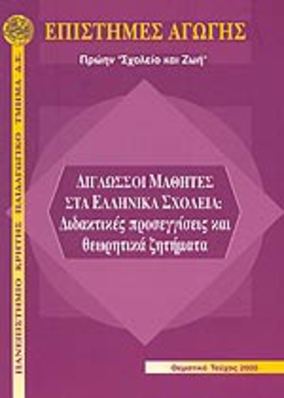Προσχολική εκπαίδευση και Ρομά μαθητές : διαμορφώνοντας πολιτισμικά σχετική διδασκαλία
Part of : Επιστήμες Αγωγής ; No.2, 2012, pages 175-189
Issue:
Pages:
175-189
Abstract:
In the last decades, the role of preschool education has been widely recognized in Greece and internationally, as shown in the new curriculums, as determinant for the later course of the children. Preschool education is the initial degree and, at the same time, an autonomous period in children education. Preschool education is a political action involving values and vision. Values, vision and expectations, however, are culturally designated. What is happening when students belong in minority and even marginalized groups? How can we turn these students’ preschool education into more effective and at the same time more empowering and emancipating? In this project, we discuss a series of strategies with the emphasis on the development of a curriculum for the teaching of language and mathematics of Roma students in preschool education. The research takes place in kindergartens in Thessaly, in conventional or purely Roma classes. The development of a culturally related instruction with high cognitive standards and expectations is believed to consist of an effective learning trajectory for students belonging in minority and marginalized groups and appears to narrowing the gap between students with different backgrounds.
Subject:
Subject (LC):
Keywords:
κουλτούρα, Ρομά μαθητές, πολιτισμικά σχετική διδασκαλία, πρόγραμμα σπουδών, προσχολική εκπαίδευση
Notes:
Περιέχει σημειώσεις και βιβλιογραφία
References (1):
- Becker, R. & P. Tremel (2011) Bildungseffekte vorschulischer Betreuung, Erziehung und Bildung fuer Migranten im deutschen Schulsystem. InBecker, R. (Hrsg.) Integration durch Bildung. Wiesbaden: VS Verlag, 57-70.Baker, B. (2009) Social Disparities in Children's Vocabulary in Early Childhood. Does Preschool Education Help to Close the Gap? Available: http://www.equalsoc.org/ uploadedfiles/publications/BeckerSocialdisparitiesinchildrensvocabulary.pdf (πρόσβαση στις 5 Φεβρουάριου 2013).Biedinger, N. & B. Becker (2006) Der Einfluss des Vorschulbesuchs auf die Entwicklung und den langfristigen Bildungserfolg von Kindern. Mannheimer Zentrum für Europäische Sozialforschung.Cresse, A. & A. Blackledge (2010) Translanguaging in the BilingualCIassroom: A Pedagogy for Learning and Teaching? The Modern Language Journal, 94(1): 103-115.Gay, G. (2010) Culturally Responsive Teaching: Theory, Research, and Practice (2nd Edition). New York: Teachers College Press.Gay, G. (2002) Preparing for culturally responsive teaching. Journal of Teacher Education, 53 (2): 106-116.Fisk, E.B & H.F. Ladd (2004) Elusive Equity: Education Reform in Post-Apartheid South Africa. Washington, DC: Brookings, Institution Press.Hasan, R. (2005) The Collected Works of Ruqaiya Hasan, Volume 1 : Language, Society and Consciousness (edited byj. Webster). London: EquinoxHilliard, A. G., III. (1989) "Teachers and Cultural Styles in a Pluralistic Society." NEA Today, 7(6): 65-69.Irvine, J. J. & B. J. Armento (2001) Culturally Responsive Teaching: Lesson Planning for Elementary and Middle Grades. New York: The McGraw Hill Companies, Inc.Ladson-Billings, G. (1994) The dreamkeepers: Successful teachers of African American children. San Fransisco: Jossey-Bass.Liégeois, J. P. (1994) Ρομά, Toryyàvoi, Ταξιδευτές. Αθήνα: Καστανιώτης.Loris Malaguzzi (2000) "When We Got the News," In Brick by Brick: The History of the XXV Aprile People's Nursery School of Villa Celia. Renzo Barazzoni, ed. Reggio Emilia, Italy. Reggio Children, 14-15.OECD (2011) PISA 2009 Ergebnisse: Potenziale nutzen und Chancengerechtigkeit sichern. Sozialer Hintergrund und Schürleistungen, Band II. Paris: OECD.Padron, Y. N. & S. L. Knight (1990) Linguistic and cultural influences on classroom instruction. In H. P. Baptiste, Jr., H. C. Waxman, J. W. deFelix & J. E. Anderson (Eds.),Leadership, equity, and school effectiveness. Newbury Park, CA: SAGE, 173-185.Pinxten, R. (1994a) "Ethnomathematics and its Practice". For the Learning of Mathematics, 14 (2): 2-25.Prengel, A. (2010) Heterogenität als Theorem der Grundschulpädagogik. In Zeitschrift für Grundschulforschung, 3 (1): 7-17.Σταθοποόλου, X. (2005) Εθνομαθηματικά: διερευνώντας την πολιτισμική διάσταση των μαθηματικών και της μαθηματικής εκπαίδευσης. Αθήνα: Ατραπός.Shor, I. (1992) Empowering Education: Critical Teaching for Social Change. (Chicago: The University of Chicago Press). Review by the Rev. Dr. Barbara Blodgett, Director of Supervised Ministries, Yale Divinity School.Tietze, W., H. L. Lee & S. Mierau (2008) Zum Zusammenhang von pädagogischer Qualität in Kindergarteneinrichtungen und Familien und dem Sprachstand von Kindern. Ministerium von Bildung Jugend und Sport des Landes Brandenburg.




